
Recently on Cyclingnews.com |
Interbike Show
Las Vegas, Nevada, USA, September 24 - 28, 2007
Main Page Previous Part Next Part
Part 12: More bikes from the floors of the Sands Convention Center
By James Huang
Seven Cycles: more carbon, please!
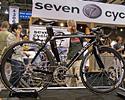
|
Seven Cycles is undoubtedly best known for its work in titanium, but the Watertown, MA-based company is apparently no slouch when it comes to carbon fiber, either. In fact, the company pioneered bonded carbon fiber-and-titanium construction (and later carbon-and-steel) on its original Odonata frame roughly a decade ago so the glue is almost certainly well-embedded in its proverbial fingernails at this point.
Seven's latest Diamas, V-II, and Triad road models use its so-called 'A6 Carbon Technology Platform', which incorporates several assembly features and techniques designed to improve the overall frame quality and enhance bond durability which still allowing for a wide range of custom geometry. Molded-in standoffs and a precision-fit CNC-machined bond surface help ensure a consistent bond layer, and carefully textured bond surfaces provide an additional mechanical lock to the joint. Moreover, joints are designed to provide an extra-large bond surface area for increased rigidity, and surfaces are prepared only just before the actual bonding occurs to minimize the possibility of surface contamination.
The mating aluminum bits are similarly designed for reliability, such as the aluminum 'spool-shaped' bottom bracket shell which is not only lighter than an identical titanium part, but also purported to offer 50% greater bond area than a typical cylindrical sleeve. Additional details include a trick titanium chain stay protector, fully guided internal cable routing, and a head tube logo that's molded right into the tubes. Tasty.
Pacific Cycle goes 'cross-eyed for 2008
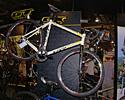
|
Todd Wells' team issue cyclocross bike is now available to the public (well, at least the frame anyway) in the form of GT's new Type CX. According to Pacific Cycle's Chris Holmes, the Type CX is "more of a pure 'cross race bike" and comes ready-to-race with Easton's EC70X fork, Vista SL wheelset, EA70 drop bars, and EA70 seatpost, along with Tektro's high-profile Euro-style cantilevers. Drivetrain components come courtesy of SRAM's Rival group and a Truvativ Rouleur crankset (with 'cross-specific 46/38T rings), and the total package still only retails for just US$1699.
Schwinn has similarly revamped its Fastback CX to be more of a 'cross-specific rig. A carbon-bladed fork damps trail imperfections while last year's compact crankset has been replaced with a standard version with more appropriate 48/39T gearing. Schwalbe's Racing Ralph tires help keep the Shimano 105/Tiagra transmission upright, while finishing kit is supplied by KORE and Ritchey. A reasonable US$1199 retail price definitely helps ease the cost of entry into 'cross as well, and Schwinn includes the neon green paint job at no extra charge.
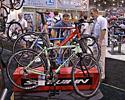
|
Schwinn has updated its value-packed Peloton LTD as well, with a substantially lighter Black Label SL tubeset that utilizes higher-end carbon fibers and a unidirectional finish that does without the woven outer layer. Last year's Mavic Ksyrium's have also been replaced by the new R-SYS wheelset, and total weight (without pedals) is still right at the UCI weight limit of 6.8kg (15lb), all for just US$4299.
Pacific Cycle's Mongoose division has updated its top-end Canaan Team XC/Enduro bike to be lighter, stiffer, and stronger than the previous iteration. Changes include a milled-out Freedom Link (the little 'H'-shaped bit behind the bottom bracket) and relocated bearings to improve rigidity and serviceability, and the tweaked frame receives some additional gussets to help it pass Europe's stringent CEN product testing standards.
As was the case on previous versions, the Canaan Team continues to pack a range-topping list of componentry, including a NoTubes Olympic Disc wheelset, Fox F100 RLC fork and RP23 rear shock, and an Easton stem, seatpost, and carbon bar. SRAM also provides a full complement of stuff, including the Truvativ Noir carbon crankset, Avid Juicy Ultimate brakes, and X-0 trigger shifters and rear derailleur. Pricing remains unchanged at a still-stellar US$3000.
Jamis trims the fat and slices through the air
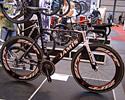
|
Jamis Bicycles launched its Xenith full-carbon road platform only last year but has wasted little time in making improvements. The new top-of-the-line Xenith SL frame now drops below the 900g mark through the use of refined lay-up schedules and higher-end carbon fibers, yet supposedly the new SL is also a better performer as well.
New internal bladders and selective use of silicone mandrels are said to yield higher compaction forces for an overall higher quality product, while an updated bottom bracket shell-chain stay interface and upsized seat tube and seatpost yield additional rigidity. As with the original Xenith, the new Xenith SL continues to use Jamis' size-specific tubing diameters and lay-up schedules to retain a consistent ride quality across the range.
New to the Xenith line for 2008 is the slippery T series, aimed squarely at the triathlon and time trial market. According to Jamis Product Manager Steven Fairchild, the new carbon fiber Xenith T frame supposedly posted one of the "lowest drag figures ever recorded" during a recent visit to San Diego's Low Speed Wind Tunnel facility.
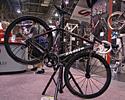
|
The Xenith T's aero tricks include NACA airfoil-shaped tubing, a tightly tucked-in rear wheel, internal cable routing, and cleverly shrouded front and rear brake calipers. The latter apparently is one of the most critical features of the new design, as swapping to a standard fork and front brake increases drag by a reported 10%.
The top-end Xenith T2 is thoroughly stacked, with specifications that include Zipp 808 carbon tubular wheels, FSA's Neo Pro TT crankset, and an Easton Attack TT integrated aero bar, along with a SRAM 10-speed drivetrain. Claimed weight is just 7.6kg (16.75lb), and the suggested retail price is US$6300.
Jamis gives the carbon treatment to its workhorse Dakar cross-country mountain bike as well, with the introduction of the new Dakar XCR Team and Pro models. The new 100mm-travel modified single-pivot platform is expectedly lighter than the alloy versions, with frame and complete bike weights reported at 2.25kg (4.96lb), including shock, and 10.66kg (23.5lb), respectively. More importantly, though, the material change should also yield a significantly more rigid frame for snappier pedaling response and handling.
Photography
For a thumbnail gallery of these images, click here
Images by James Huang/Cyclingnews.com
- Seven's striking Diamas frame delivers the company's usual custom fit but in carbon fiber, and after a bit of a delay, is now shipping to dealers.
- Who needs a head tube badge? Seven Cycles molds its logo right into the tubes.
- The Diamas uses an extended seat tube and a short seatpost 'stub' in lieu of a traditional post.
- Strategically placed guards on the bottom bracket shell and chain stay help protect the frame in the event of a dropped chain or chainsuck.
- The Seven Cycles V-II offers much of the performance of its top-end Diamas but in a less radical shape.
- Seat stays stay snug around the tire then arc out to the dropouts.
- The V-II uses a conventional seatpost.
- Seven-sponsored rider Mary McConneloug's Sola hardtail was on display at the company's Interbike booth.
- Bar ends? Yup, bar ends. The majority of the mountain biking community may have already labeled the things as vestigial, but they're still a common sight in the pro ranks.
- McConneloug makes liberal use of items out of FRM's catalog, but apparently has little need for a granny.
- McConneloug's fi'zi:k Aliante saddle tops a lightweight FRM carbon fiber seatpost.
- Seven Cycles created this custom '69er' for Mike Broderick.
- Don't try this at home, kids. Broderick uses a lightweight carbon fiber rigid fork but can fairly easily get away with it thanks to the enhanced bump-eating capabilities of the bigger front wheel.
- McConneloug and Broderick clearly have these cranks delivered in pairs.
- Seven's custom titanium stem caps off the FRM headset on Broderick's rig.
- One of the most interesting machines in Seven's booth , however, was this one-off commuter rig built by one of Seven's employees.
- Nope, this front rack isn't in the Seven catalog nor does the company even offer it as a custom option.
- The one-off front rack attaches to the fork legs and to the steerer tube above the upper headset cup.
- What's that pattern', you ask? That's the shape of the little plates that Seven welds over the ends of its seat- and chain stays.
- Handy LED lights are integrated right into either side of the rack for nighttime visibility.
- GT's new Type CX is billed as more of a 'pure 'cross race bike' and is built around the same frame used by Todd Wells.
- Easton provides much of the finishing kit , including its EC70X fork with carbon blades.
- Proper 'cross gearing comes at no extra charge.
- High-profile cantilever brakes from Tektro provide the mud clearance of pricier designs but are far easier to adjust.
- SRAM's Rival group should deliver dependable performance when things get muddy.
- The new GT Marathon 29 takes the company's Independent Drivetrain suspension design (previously known as i-Drive)…
- …and adapts it for use with larger 29" hoops.
- GT's 29er repertoire is also padded with this rasta-inspired hardtail…
- …as well as a 29" singlespeed.
- Yup, it's back! GT reintroduced the legendary Zaskar frame…
- …complete with the original Triple Triangle design.
- Schwinn revises its Fastback CX to be more 'cross-specific for 2008.
- Changes include a 'cross-appropriate standard-sized crankset instead of last year's compact unit.
- A carbon-bladed fork should help take the edge off of course obstacles.
- The new Schwinn Prologue is intended as an entry-level turnkey triathlon/time trial machine.
- Features include and aero-profiled seat tube capped with a matching aero post.
- Schwinn's value-packed Peloton LTD carries on for 2008…
- …complete with Mavic's new R-SYS wheelset.
- The Madison fixie is largely unchanged for next season…
- …but receives a new 70's-inspired paint scheme and durable chrome stays.
- As usual, Schwinn will offer a wide range of casual cruisers…
- … but reintroduces the two-speed kickback hub for 2008. Anyone up for coffee?
- The Mongoose Canaan Team is lighter, stiffer, and stronger for 2008.
- A hogged-out Freedom Link helps pare some weight, and relocated bearings improve rigidity and serviceability.
- The Canaan Team continues to deliver an extraordinary value for its US$3000 asking price, including Truvativ's top-end Noir carbon cranks…
- …and Fox Racing Shox' updated F100 RLC fork.
- The new Jamis Xenith T2 supposedly yields one of the lowest drag figures ever recorded at San Diego's Low Speed Wind Tunnel.
- The front brake is sheathed behind the fork crown.
- Likewise, the rear brake is sheltered down behind the bottom bracket shell.
- The carbon fiber Xenith T-series aero post provides two positions depending on rider preferences.
- The top-end Xenith T2 includes FSA's new Neo Pro TT crankset.
- Jamis Bicycles' latest Xenith SL carbon platform drops weight from last year's introduction for a final figure of under 900g…
- …and clearly is capable of building up into an ultralight machine as demonstrated by this one-off project build.
- A THM-Carbones Clavicula crankset helps shed a bunch of weight from the project bike, but the top production model will be outfitted with a more standard SRAM Red group.
- Jamis' Xenith SL project bike was also equipped with Lew's latest sub-900g wheelset. The production wheelset is no slouch, either, being the deep-section 404 model from Zipp.
- Mmm… red.
- AX-Lightness is a perennial 'go-to' option in the lightweight wars.
- The front derailleur clamp is provided by Parlee.
- Jamis' Dakar XCR Team gains a carbon fiber version for 2008…
- … and use the company's tried-and-true modified four-bar linkage design to yield a final claimed weight of just 10.4kg (23lb).
